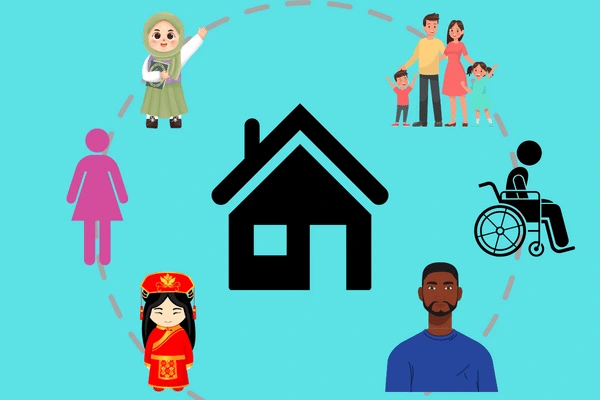
The federal Civil Rights Act of 1968 consisted of three parts: (1) the Indian Civil Rights Act (Titles 2-7), (2) the Fair Housing Act (Titles 8-9), and the Anti-Riot Act (Title 10).
The purpose of the Fair Housing Act (FHA) was to follow up on, clarify, and strengthen the protections that the Civil Rights Act of 1964 provided to home buyers and renters.
Below are 10 things that every real estate agent should know about the Fair Housing Act:
- The FHA was passed in 1968 but has been amended several times since.
- The FHA originally banned discrimination in real estate sales, leasing, and financing on the basis of race, color, religion, or national origin.
- A 1974 amendment expanded the FHA to also ban discrimination on the basis of sex.
- A 1988 amendment banned discrimination on the basis of disability or familial status (i.e. whether or not you have kids under the age of 18 living in the house).
- Altogether, the modern FHA bans discrimination on the basis of 7 protected classes: race, color, religion, national origin, sex, disability, and familial status.
- The FHA applies to most single family homes and multifamily properties. However, the FHA does NOT apply to (1) owner-occupied buildings with 4 or fewer units, (2) single-family homes rented without a broker, so long as the owner does not own more than 3 houses, or (3) commercial office, retail, or industrial property.
- The FHA’s ban on discrimination on the basis of familial status does NOT apply to senior housing properties that are part of 55+ or 62+ communities.
- Specific practices banned by the FHA include (1) refusing to rent to someone because they are a member of a protected group, (2) quoting different terms or prices based on prospects’ protected characteristics, (3) discriminatory advertising, (4) steering buyers or renters to different particular areas based on their protected characteristics, (5) blockbusting (i.e. telling homeowners that their neighborhood is undergoing a change of demographics as measured by protected characteristics, in order to influence the homeowner’s desire to sell or rent at lower-than-market-value), (6) redlining (i.e. refusing to lend to a creditworthy applicant to buy a home in a particular neighborhood, or lending to them at higher interest rates or offering insurance at higher rates), and (7) making false statements about the availability of a property.
- The Office of Fair Housing and Equal Opportunity within the U.S. Department of Housing and Urban Development (HUD) is responsible for administering and enforcing the FHA.
- The U.S. Department of Justice (DOJ) can initiate a lawsuit in a U.S. District Court if (1) a person believes they have been discriminated against in violation of the FHA and requests the DOJ to bring suit, (2) a real estate professional repeatedly violates the FHA, or (3) a real estate professional breaches a conciliation agreement created during an earlier dispute over an alleged FHA violation.
- If a discrimination claim is made against a real estate agent or broker, HUD assumes that the agent or broker is guilty unless proven innocent. The agent or broker has 10 days to answer a HUD claim with proof that they did not discriminate. If the agent or broker cannot prove their innocence, they can be hit with injunctions, restraining orders, and orders to pay damages, court costs, and attorney fees.